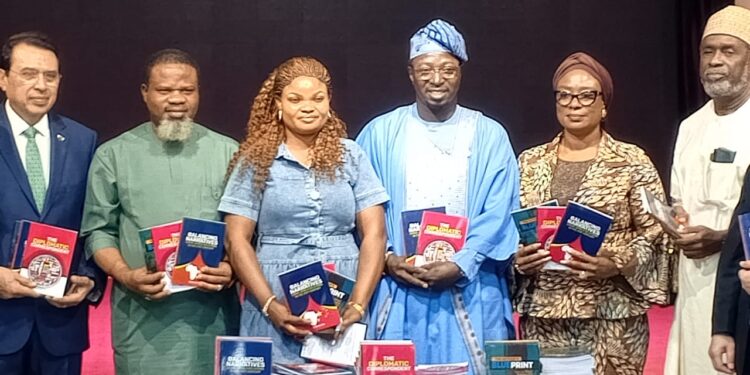By Queen Kunde
A chorus of voices from diplomacy, academia, and journalism came together on Wednesday to dismiss allegations of China’s covert ambitions in Africa, declaring instead that the Asian giant remains a committed and transparent development partner.
The occasion was the Media Executives Forum and Book Launch held at the China Cultural Center in Abuja, where journalist Raphael Oni unveiled his new book, Balancing the Narrative: China-Africa Relations. The event drew diplomats, scholars, and media professionals from across Africa and beyond, united in their call for more accurate, Africa-centric coverage of the continent’s evolving relationship with China.
“There is a gap in understanding China’s role in Africa,” Oni said. “Much of what’s out there is shaped by Western media narratives that do not reflect our lived experiences. This book aims to set the record straight.”
The book draws on Oni’s research and time in China as part of a media training program. It outlines China’s impact on the continent in areas such as infrastructure, education, and technology, spotlighting major projects like roads, railways, and airport construction—all backed by Chinese funding and expertise. He also highlighted training and exchange programs for African professionals and students as proof of China’s commitment to capacity-building.
Mr. Charles Onaikwe, Director of Chinese Studies in Nigeria, applauded Oni’s effort as a step toward “knowledge-driven cooperation.” He emphasized the need to challenge the myths surrounding China’s presence in Africa and promote informed discourse.
Chris Isiguzo, President of the African Union of Journalists, urged Nigerian leaders to adopt China’s long-term, development-driven mindset. “China didn’t get to where it is overnight. It was built on vision, planning, and strong national will,” he said.
Diplomatic representatives from Sierra Leone, Malaysia, and Mexico echoed these sentiments in goodwill messages, lauding the book’s effort to foster mutual understanding and cultural exchange.
A major theme of the forum was the need for African media to reclaim the narrative. Speakers stressed that African journalists must take charge in portraying the continent’s global partnerships through informed, fact-based storytelling rather than relying on foreign interpretations.
Delivering the official book review, Prof. Sheriff Ghalib Ibrahim of the University of Abuja hailed Oni’s work as a “timely intellectual intervention.” He praised the book for debunking lingering colonial myths and challenging the global media’s continued exclusion of African perspectives.
“It’s frustrating to see Western analysts speak for Africa on platforms like CNN and BBC,” Prof. Ibrahim said. “Balancing the Narrative is a powerful step toward ending that trend.”
Prof. Ibrahim traced the philosophical roots of China-Africa cooperation back to the 1955 Bandung Conference, noting that the book rightly frames modern collaboration as an extension of post-colonial solidarity. He also used the opportunity to confront common Western critiques of China on issues like Taiwan and human rights, calling out what he described as “selective outrage and double standards.”
He further applauded the book’s documentation of real-world successes, such as Tanzania’s Magufuli Bridge, a project built entirely by Chinese engineers.
As the event wrapped up, participants agreed on one central message: Africa’s story must be told by Africans, and the continent must forge forward in partnership with nations that respect its sovereignty and development goals.
“China is not hiding anything,” Oni concluded. “It’s time the world listened to Africa’s voice on its own affairs.”


